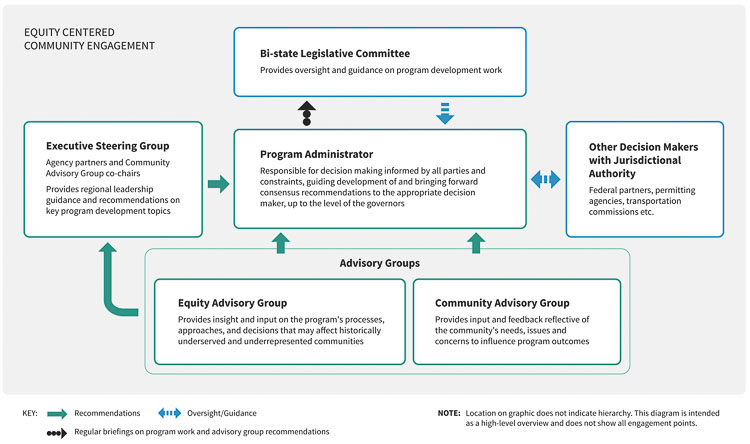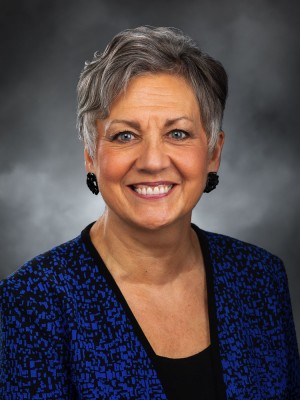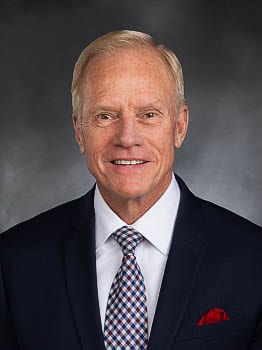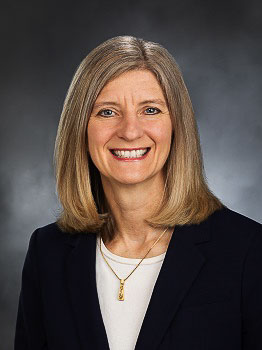
Clark County Today Editor Ken Vance shares some pointed comments from area elected officials about the process to create a project
The Bi-State Bridge Committee met for the first time in front of a packed house at City Hall in Vancouver in October 2019. There was great anticipation for the 16-member committee of legislators from the two states. There were still lingering wounds from the failed Columbia River Crossing (CRC) project that met its ultimate death in July of 2013 when members of the Washington State Senate narrowly voted against a funding proposal.

The eight legislators from Washington, six from Clark County, are supposed to provide oversight to Interstate Bridge Replacement Program Administrator Greg Johnson and his team. They are joined by eight Oregon legislators who supposedly are looking out for Oregon’s interests, just as the Washington legislators do for citizens on this side of the Columbia River.
A page on the IBR website has a diagram that shows the various advisory groups, committees and other officials that are contributing to the process of determining a project to replace the I-5 Bridge. To the average observer, the diagram can easily be described as confusing at best.
There is a note on the diagram that informs those viewing it that, “location on graphic does not indicate hierarchy. This diagram is intended as a high-level overview and does not show all engagement points.’’ With that disclaimer in mind, the Bi-state Legislative Committee is listed at the top of the diagram.
The diagram shows that the 16-member committee “will receive regular briefings on program work and advisory group recommendations’’ from the program administrator. And, the committee, in turn, “provides oversight and guidance on program development work’’ back to the program administrator.

Many observers put their faith in this group of legislators to prevent the next Interstate Bridge replacement project from following the same path, and ultimately the same demise, as the CRC. In the two and a half years since that first meeting, the Bi-State Bridge Committee has met many, many times and have received many, many briefings from Johnson, the IBR administrator. While no one can really question that element of the group’s history, two of the committee’s legislators recently expressed frustration over how much oversight and guidance they have been allowed to provide in return.
The comments were made to Clark County Today in response to inquiries made after the IBR team revealed more details of the current project during meetings of the Bi-state Bridge Committee and the Executive Steering Group (ESG) on April 21. The most notable decision was that an extension of TriMet’s light rail into downtown Vancouver was preferred over Bus Rapid Transit.

“I oppose the proposal as it is currently being recommended,’’ said Sen. Lynda Wilson (Republican, 17th District). “I’m still awaiting a complete design of this project. As for a solution or alternative … I’m looking at the options that have been presented to us, since public input was a high priority. As I mentioned in the latest meeting, though, I feel like the train has left the station. Clearly, I haven’t been included in meetings where decisions have been made. Also, I still ask the question, who has the ultimate authority to give this project a thumbs up? Stay tuned.’’
Wilson and fellow committee member Rep. Paul Harris (Republican, 17th District) have each asked Johnson if the legislators will ever be given the opportunity to vote on any of the details of the current project. Johnson responded to Wilson’s question, indicating they would not be given a formal vote. Instead, the IBR team would be asking for a “sense of the will of this committee” and ask them to give approval for the team to move forward to the next phase. This is reminiscent not only of the previous Columbia River Crossing (CRC) effort; but also the Value Pricing PAC meetings where the staff rather than PAC members made the choices.

“I still have a lot of questions and I’m in the meetings,’’ said Harris, who believes the more important question is if the legislators are allowed to vote, will their votes have any impact? “I think voting and carrying weight are two different things. Will the vote mean anything? We’ve been led to believe we will have an opportunity to vote. I’m not sure if we will get that opportunity. But, I would still want to vote because I think it’s important to know where we stand on this. It’s not as simple as yes or no.
“I still have a ton of questions,’’ Harris added. “I find it very interesting how far down the line we have to get before we have these discussions. I have concerns, lots of concerns.’’
“I’m the member who called for a vote,’’ said Wilson, referring to the most recent meeting of the committee. “It wouldn’t be officially binding, but in the interests of transparency all 16 of us should be prepared to put our cards on the table for all to see. If there was a good way to also force the IBR Executive Steering Group to be more transparent, I would be doing that too. Again, it’s about earning trust.’’
If the IBR team members haven’t earned the trust of two of the legislators on the Bi-state Bridge Committee, how much trust have they earned among citizens trying to follow this process? If Wilson, after being a member of the committee for two and a half years, feels powerless because the “train has left the station,’’ how much influence can any other elected official have?

“Transparency and accountability are what have been missing from this project – and they were sorely missing on the prior project (CRC) as well,’’ said Rep. Vicki Kraft (Republican, 17th District). “As elected officials, we must all be accountable to the people. I would argue it’s especially important on this project given the large amount of taxpayer funding being used, the challenges of the past, and to make sure the people’s top priorities are properly addressed with this or any other project.’’
Kraft is an outspoken proponent of the construction of a third crossing over the Columbia River prior to the completion of a project to replace the I-5 Bridge. She said the inclusion of light rail on the current project proves that lack of transparency and accountability.
“It’s very telling,’’ Kraft said. “This project has been about pushing light rail all along and now the people can see it clearly with bus rapid transit being taken off the table.’’

County Chair Karen Dill Bowerman would also like to see the legislators have an opportunity to vote on the details of the I-5 Bridge replacement.
“Yes, this is appropriate in the name of transparency,’’ Bowerman said. “Some say it was inevitable that bus rapid transit would be eliminated in favor of light rail. Bus rapid transit would have opened avenues for better connectivity in Washington, and would have required much less capital investment as well as maintenance cost. I am not convinced that our residents are any more in favor of light rail (today) than when they voted it down in the polls.’’
If this project moves forward, it will be the largest single transportation expenditure in the region’s history, estimated at more than $5 billion. (Wilson points out that virtually every transportation project in the state ends up costing more than was estimated.) Yet none of our elected representatives have been allowed or required to go “on the record” regarding any of the key decisions.
For me that begs answers to two questions. If the legislators and elected officials are not in charge of the project, then who is? Will other legislators and elected officials stand up to those in charge to keep more than $5 billion of taxpayer dollars from being spent on this project?





It’s kinda karmic. The legislators selling out this community must have known, as we all knew, that without loot rail, there wouldn’t be a bridge replacement.
How could they even remotely believed there would be any other alternative?
They know, as we all know, that no other alternative was considered. None.
They SAY there was, but simply put, they’re lying.
It seems strange to me that these fake Republicans are bending us over so easily.
One has to wonder: the vast majority of us who spent years working on killing this horrific waste of hundreds of millions of dollars and permanent, forever always-increasing tolls, AND light rail were, well aware that these people would be ignored, just like the memo that popped up with the last effort to ram this garbage down our throat where the people were ignored BY WRITTEN policy.
“‘“I still have a lot of questions and I’m in the meetings,’’ said Harris, who believes the more important question is if the legislators are allowed to vote, will their votes have any impact?”
WHY DIDN’T HE ASK THIS QUESTION AT THE START?
HOW COULD THESE PEOPLE NOT GET THAT THE ONLY FUNCTION THEY SERVE IS WINDOW DRESSING, AND NOTHING THEY SAY OR WANT MATTERS???
AND IF NONE OF THEIR VOYES ARE BINDING… THEN WHY DID THEY BECOME A PART OF THIS LYNCH MOB???
Elect these people? I wouldn’t let them run an elevator for me.
And now they seem to act all surprised.
If they didn’t know?
It’s because they didn’t WANT to know.
How Harris and Wilson, et al, actually believed that they would make any difference in this ripoff is beyond me.
Are they really that gullible? Here’s a clue: OREGON DOESN’T CARE. And the people driving this crap to enrich their friends DON’T CARE. Inslee DOESN’T care.
NONE of this is for us, to help us, to make our lives better. Its a horrifically expensive, outmoded type of transportation that moves the LEAST amount of people for the most POSSIBLE amount of money. (Think about it: is there a more expensive form of transportation anywhere in the world than this rip off?)
And these people were clueless enough to believe they would have ANY say over ANY of this?
Seriously?
That these people were ever elected even to dog catcher is an embarrassment. They should have known.
All they’ve done is help Oregon to put their noose around our wallets. And they willingly went along with it. It’s far too late for them to ask about having any impact.
Far too late for them.
Far too late for us.
I fail to see where they were given any opportunity for input. Most of the decisions were already made. I’d like to know of recent studies of how many Clark County residents would use light rail to cross the river and how frequent. How many even work in areas thst could be served by a speedy ride by light rail?
Amanda – good questions.
But I’d like to point out that light rail (especially the Yellow Line), is anything but “speedy”. The MAX Yellow Line travels an average of 14 mph.
Nobody I know wants to travel that slow going to or from work, or any other destination.
Look at the pension funding for Oregon’s Max system and TriMet. According to the federal laws if your funding is less than 80% it is deemed “endangered”. It is at “critical status” at 65% and “critical and declining” or completely insolvent at that 65% rate if it cannot provide solid planning data to turn it around within 15 years starting immediately. When the CRC was a “project planned vision” I think I saw a 90% UNFUNDED number. This is the only way they can sustain continuation… strip Washington of our money!
These are the WA state legislators on the bi-state committee. Contact your legislators.
https://leg.wa.gov/JointCommittees/OWLAC/Pages/Members.aspx
The next meeting of the bi-state committee is Friday, May 6 at 9 AM.
Residents can comment in writing, and a few will be granted 2 minutes to testify at the end of the meeting, around 11:30 AM
See agenda for details
https://olis.oregonlegislature.gov/liz/2021I1/Committees/JI5B/2022-05-06-09-00/Agenda
Light rail is not required on a replacement bridge or tunnel. A tunnel option has been presented which includes interesting graphics about the IBR light rail plan
https://olis.oregonlegislature.gov/liz/2021I1/Downloads/CommitteeMeetingDocument/255151
Dear Editor, you forget who has power in Washington: Puget Sound. The three counties on the east bank of the Sound (Pierce, King and Snohomish) collectively make up more than half the population of Washington State. So when they agree on something, the rest of the State can pound sand.
Now it’s certainly true that the suburban legislators in Pierce and Snohomish often quarrel with the more urban group from King County, but on this topic they agree. They have all decided that this bridge needs to be replaced, and soon. They want some reliable “backup” in their food supply from California, and they have a billion from Uncle Sugar to spend securing it. This bridge will be built.
The governments of the two states are in accord on many things, so Washington State is not going to embarrass and disappoint Oregon on this bridge issue again. If Oregon wants LRT — wasteful though it will probably turn out to be — Washington won’t object. Since neither State wants to spend yet more money than they have pledged, they will support tolling to amortize bonds. The truth is, Puget Sound doesn’t care about our little spats about tolls and Light Rail. They have both and get along just fine with them so why can’t we?
So, Dear Bi-State Legislative Committee representatives, start pounding.